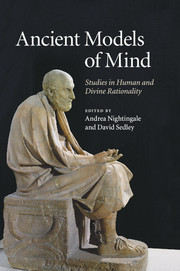Book contents
- Frontmatter
- Contents
- List of contributors
- Introduction
- 1 Plato on aporia and self-knowledge
- 2 Cross-examining happiness: reason and community in Plato's Socratic dialogues
- 3 Inspiration, recollection, and mimēsis in Plato's Phaedrus
- 4 Plato's Theaetetus as an ethical dialogue
- 5 Contemplating divine mind
- 6 Aristotle and the history of skepticism
- 7 Stoic selection: objects, actions, and agents
- 8 Beauty and its relation to goodness in Stoicism
- 9 How dialectical was Stoic dialectic?
- 10 Socrates speaks in Seneca, De vita beata 24–28
- 11 Seneca's Platonism: the soul and its divine origin
- 12 The status of the individual in Plotinus
- A. A. Long: publications 1963–2009
- Bibliography
- Index
5 - Contemplating divine mind
Published online by Cambridge University Press: 06 December 2010
- Frontmatter
- Contents
- List of contributors
- Introduction
- 1 Plato on aporia and self-knowledge
- 2 Cross-examining happiness: reason and community in Plato's Socratic dialogues
- 3 Inspiration, recollection, and mimēsis in Plato's Phaedrus
- 4 Plato's Theaetetus as an ethical dialogue
- 5 Contemplating divine mind
- 6 Aristotle and the history of skepticism
- 7 Stoic selection: objects, actions, and agents
- 8 Beauty and its relation to goodness in Stoicism
- 9 How dialectical was Stoic dialectic?
- 10 Socrates speaks in Seneca, De vita beata 24–28
- 11 Seneca's Platonism: the soul and its divine origin
- 12 The status of the individual in Plotinus
- A. A. Long: publications 1963–2009
- Bibliography
- Index
Summary
This essay is a bit of bronze in exchange for the gold of Tony Long's conversation, teaching, and especially friendship over the past quarter century.
For both Plato and Aristotle, the doctrine of becoming like god is one of the outcomes of the inquiry into the question that matters most to us humans, namely the question of how one ought to live one's life. This is the most practical of questions for both Plato and Aristotle, involving how we manage our affairs, order our desires and choose our actions with the aim of living the best life possible, namely, a happy life. For both, becoming like the divine as much as possible is one way of describing the nature of human happiness. Striving to be like, or better modeling ourselves on, the divine mind is one way of expressing what we humans do in trying to realize our happiness, whether or not we are aware of our striving to achieve this. What thus begins as the most human of inquiries threatens to end with the recommendation that we should flee what is human in order to be something else, i.e., divine. I will refer to this as the “flight interpretation.” Indeed many readers of Plato have concluded that the search for happiness leads the philosopher to turn his/her back on the mundane world and eschew practical activity as much as possible. Not a few readers of Aristotle find that ultimately he recommends a similar outcome.
- Type
- Chapter
- Information
- Ancient Models of MindStudies in Human and Divine Rationality, pp. 75 - 96Publisher: Cambridge University PressPrint publication year: 2010
- 3
- Cited by



